A million years ago, my friend Lauren and I had a conversation about books and snacks and said we’d do it again, though we didn’t know when. Well, we were even lazier than we realized.
But we managed to finally have another online chat, this time about Rachel Khong’s superb Goodbye, Vitamin. As usual, Lauren is the one who brings up testes.
Oh, and the title of this post? It refers to the cracking of books’ spines. Mr. PCN came up with it as the name of this series of conversations. As if Lauren and I are capable of doing it again. Let’s see first if we can crank this baby up to 11.
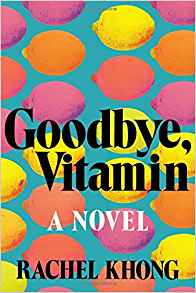 Pop Culture Nerd: Hey, you there?
Pop Culture Nerd: Hey, you there?
Lauren: I don’t see anything.
PCN: …
L: Never mind, figured it out.
PCN: This will be part of the transcript.
L: Then I won’t swear at you out of the gate.
PCN: Swear away, but not at me since I’m not the problem.
L: My swear was going to be your inclusion of my ineptitude, but since that will not be a surprise to anyone, let’s get on with the show. Would you like to start with the lovely and funny Goodbye, Vitamin?
PCN: Yes, but first we need to talk snacks. What do you have on hand?
L: I think I failed at snacks last time, too, didn’t I? I just crammed some Trader Joe’s mac and cheese down my gob before we started. You?
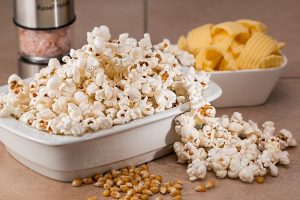
Photo: Pexels. I don’t take pics of my food.
PCN: Mmm. Mac and cheese. I’m eating popcorn with sea salt and chili lime corn chips.
L: You’re so much better at that than I am. It’s also fitting we start with Snack Talk since Vitamin includes some pro-level snacking. Because I’m a weirdo, I counted the different foods mentioned: 142. I think my first text to you while reading was “I love this already, tons of snacks and missing pants.”
PCN: Yes! Snacks + no pants = perfection. It’s clear Rachel Khong knows what she’s talking about, whether it’s food or life or dementia. The impressive thing is her specificity. She cuts out all but the most riveting details, leaving nothing but scalpel-sharp observations.
L: She did a fantastic job with an emotional topic (dementia) in a difficult format (diary entries). In most books, that many mentions of one category of things, especially in fewer than 200 pages, would drive me insane. That she makes those feel such a natural and welcome part of the story evidenced a fabulous talent to me. Should we interrupt ourselves with a plot summary?
PCN: A 30-year-old woman, still smarting from the breakup of a relationship, goes home to help take care of her father, who’s suffering from dementia. She keeps a diary while there, and it’s funny AND poignant. How’s that?
L: Perfect. You read it before I did, which was fun because I then got to bombard you with texts while I was reading. One thing you mentioned that we both agreed on is that this one grabbed us both right off the bat. Opening line: “Tonight a man found Dad’s pants in a tree lit with Christmas lights.” Hilarious, poignant, and those wonderful, specific details you mentioned, all right in the first line. It only gets better from there.
PCN: A man stages a protest by throwing away his pants—how could that NOT grab us right away?
L: More than ten mentions of pants. (I’m starting to sound like Rain Man).
PCN: Is it 13 minutes to Judge Wopner? There are so many funny details. When I first heard this book had a character with dementia, I thought, NOPE. That’s a painful subject for me. But I kept hearing how witty Vitamin is, and I’m intrigued by writers who can find the humor in difficult situations. I’m so glad I took Vitamin. (Corny?)
L: Ha. Yes, corny, but I laughed. I had also passed it by, and I can’t even say why since I like difficult and painful stuff (was Rain Main also a masochist?). What blew me away about Khong’s writing is just what you mention above—all the details related to both the humor and the pain. All those mentions of food make it clear how important food is/was to this family.
And yet Ruth’s mom stops cooking because she feared anything but juice and vitamins might have contributed to Ruth’s dad’s dementia. That was heartbreaking. To get those ideas across so well in short diary entries is…let’s just say I was astounded to learn this was Khong’s debut and that she wrote in diary format because she didn’t think she had the chops (corny?) to write a novel. Methinks she’s way off base with that self-assessment.
PCN: With all the rave reviews, I hope she realizes she’s quite good as a novelist. Looking forward to seeing what she writes next.
L: I will pick up her next offering immediately, without regard to cover or subject matter. We are not easily won over (some might even say difficult), but she snagged us but good.
PCN: Oh, I want to mention one of my favorite lines. In her dad’s journal that he kept about her childhood, he wrote about how after he kept telling her to behave, little Ruth got frustrated one day and yelled, “I’m BEING have!”
L: That was a great line, out of so many. It will come as no surprise that one of my favorites includes “testes.” Oh, shit, I meant “balls,” but in the meaning of testes.
PCN: Balls always make a book better. Remind me: the balls weren’t mentioned in a food context, right?
L: Ha. No. They were talking about jury duty, which led to this diary entry about what her dad told her: “The word ‘testify,'” you said, “comes from testicles. Men used to swear by their balls.”
PCN: So honorable.
L: There was a mention of meatballs.
PCN: Now I want spaghetti. I liked how, when Ruth watched an old movie in which her dad was a background actor, she saw him sitting in the back eating an olive on a toothpick. Another great example of Khong’s specificity. She didn’t just write Ruth caught a glimpse of her dad onscreen. She described exactly what he was doing.
L: She knocked those details out of the ballpark. Which reminds me, before we move on, I have to say that you, sports hater extraordinaire, using a sports analogy to describe this book to me has to be the greatest compliment/blurb of all time. I can picture this on the paperback version: “Nailed me in the sweet spot. Or whatever that saying is.” —Pop Culture Nerd
PCN: Huh? I don’t even know which sports analogy I used.
L: That’s the beauty of it.
PCN: If you say so. Hey, all this talk of food has made me hungry.
L: Let’s shut ‘er down and eat.
Buy Goodbye, Vitamin from Amazon
The above is an affiliate link that provides a small commission to PCN if used.
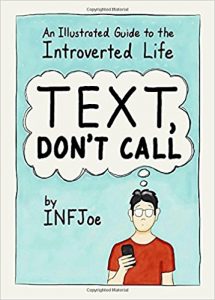 Twenty years ago, as illustrator and author Aaron Caycedo-Kimura was trying to figure out what to do with his life, he made a monumental discovery: he was an introvert, specifically an INFJ, according to the Myers-Briggs Type Indicator. “The description nailed and validated me; among other things, INFJs are deeply emotional, empathetic, relational, and INTROVERTED.”
Twenty years ago, as illustrator and author Aaron Caycedo-Kimura was trying to figure out what to do with his life, he made a monumental discovery: he was an introvert, specifically an INFJ, according to the Myers-Briggs Type Indicator. “The description nailed and validated me; among other things, INFJs are deeply emotional, empathetic, relational, and INTROVERTED.”
 Pop Culture Nerd: Hey, you there?
Pop Culture Nerd: Hey, you there?


 At book number 13, I’m still as in love with Craig Johnson’s Walt Longmire series as I was at book 1. This installment takes readers into some of Walt’s backstory—the early years with his wife Martha—and a deadly train trip of Wyoming Sheriffs on a locomotive named The Western Star.
At book number 13, I’m still as in love with Craig Johnson’s Walt Longmire series as I was at book 1. This installment takes readers into some of Walt’s backstory—the early years with his wife Martha—and a deadly train trip of Wyoming Sheriffs on a locomotive named The Western Star. This stunning YA novel about three generations of women from an Indian family is both timely and timeless. As teenagers, Sonia and Tara Das move to the United States with their parents. The girls attempt to acclimate to their new home in their individual styles while their mother holds tight to the cultural traditions and norms of India. Their clash of personalities comes to a peak when Sonia elopes with a man her mother disapproves of, causing an estrangement between the two.
This stunning YA novel about three generations of women from an Indian family is both timely and timeless. As teenagers, Sonia and Tara Das move to the United States with their parents. The girls attempt to acclimate to their new home in their individual styles while their mother holds tight to the cultural traditions and norms of India. Their clash of personalities comes to a peak when Sonia elopes with a man her mother disapproves of, causing an estrangement between the two.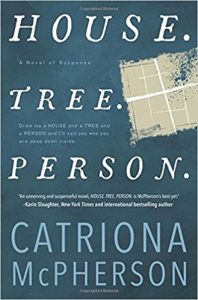 Ali gets a job at a psychiatric hospital despite her lack of qualifications, but finds the residents take to her. Her success with patients gets her in trouble with the spooky couple running the facility.
Ali gets a job at a psychiatric hospital despite her lack of qualifications, but finds the residents take to her. Her success with patients gets her in trouble with the spooky couple running the facility.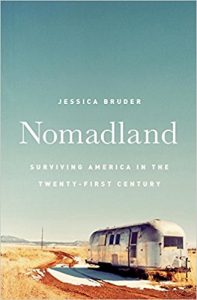 For three years, journalist Jessica Bruder immersed herself in an exploding American subculture—individuals, couples, and families who have forsaken real estate for “wheel estate,” living on the road performing itinerant work to make ends meet.
For three years, journalist Jessica Bruder immersed herself in an exploding American subculture—individuals, couples, and families who have forsaken real estate for “wheel estate,” living on the road performing itinerant work to make ends meet. Seriously, who wouldn’t fall in love with a title like that? Annie Spence is witty and fun, and I think she’d be a blast to work with.
Seriously, who wouldn’t fall in love with a title like that? Annie Spence is witty and fun, and I think she’d be a blast to work with.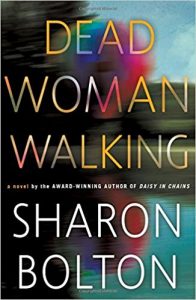 Here I am talking about trying to relax and unwind, and yet I’m recommending this book that kept me TENSE the whole time I was reading it. Sharon Bolton usually has that effect on me. And I love it.
Here I am talking about trying to relax and unwind, and yet I’m recommending this book that kept me TENSE the whole time I was reading it. Sharon Bolton usually has that effect on me. And I love it.